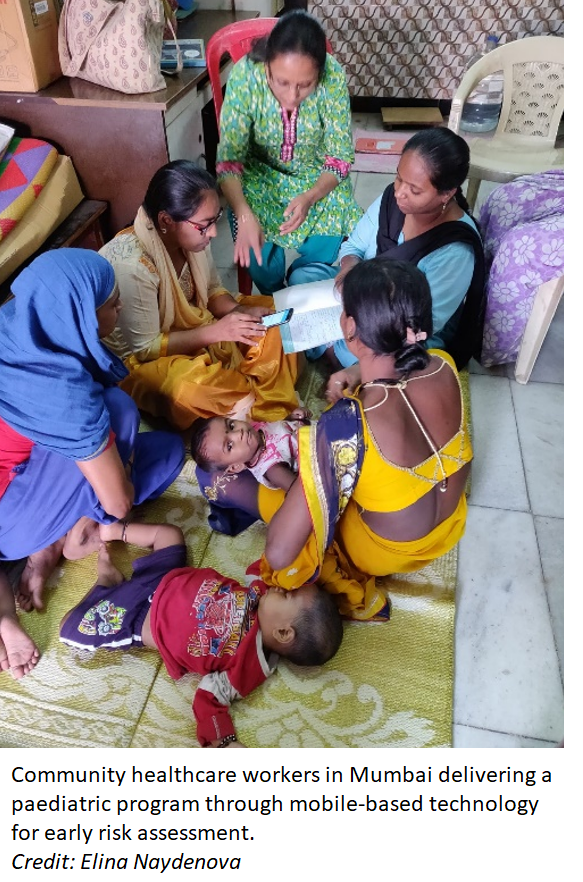 Elina Naydenova is the CEO and co-founder of Feebris, a company whose AI-powered platform enables carers and health workers to assess health risk in the community and enable early detection of deterioration. She is a biomedical and AI engineer, with a PhD in Machine Learning for Healthcare Innovation from Oxford University. Here, Elina tells TDR how the Social Innovation in Health Initiative catalysed the founding of her company.
Elina Naydenova is the CEO and co-founder of Feebris, a company whose AI-powered platform enables carers and health workers to assess health risk in the community and enable early detection of deterioration. She is a biomedical and AI engineer, with a PhD in Machine Learning for Healthcare Innovation from Oxford University. Here, Elina tells TDR how the Social Innovation in Health Initiative catalysed the founding of her company.
This interview has been edited and condensed for length and clarity.
How did you first become involved with SIHI, and what was your role?
At Oxford, my PhD was specifically focused on developing AI algorithms for detection of childhood pneumonia. In addition to that, I started working with the Skoll Centre for Social Entrepreneurship at Oxford. This was around the time SIHI was founded. It was TDR, the Skoll Centre and the Bertha Centre for Social Innovation & Entrepreneurship that came together at the origin of the programme with Pamela Hartigan, who was quite a visionary behind the idea of the whole thing. My role was to support the development of the programme, and then once we got the programme off the ground, I was responsible for the innovators in India because we had quite a big cluster of innovators working there - evaluating their work, exploring how the ecosystem is supporting them and trying to identify the common factors for why a social innovation fails or succeeds in low-resource settings. This experience gave me exposure to many very passionate and exciting people who were developing innovations in this space.
The biggest benefit that SIHI brought was creating a community of like-minded change-makers.- Elina Naydenova, CEO and co-founder of Feebris
How did your experience with SIHI inform the founding of your own company?
The experience itself was quite formative for me as a professional because of the opportunity to see first-hand both the immense innovation that happens in social health programmes and initiatives but also the struggles, especially when it comes to scalability and sustainability. I had the opportunity to visit all of these innovators in India, spending almost a week with each of them. And we dug deep into how these programmes are embedded in specific settings and identifying the enablers and barriers that make these innovations work or fail. And we also looked into the innovator’s character and what’s required to really push something that's complicated in a challenging environment. I developed so much respect for the resolve that these people have and the change that they managed to bring about, and also took away lessons learned around the need for sustainable business models to scale these ideas.
 After I finished my PhD, I set up my own company, Feebris, with a vision of democratizing access to early detection of disease in community and home settings globally, particularly for the most vulnerable patients. Our mission has been developing software that enables anyone operating in a community setting to be able to conduct a clinical-grade exam and assess risk. The biggest lesson for me and what I have taken from SIHI in approaching this was one around identifying the generalizability of these challenges. On the surface, community health care workers in India and their challenges might appear to be very different from those of a worker in an elderly care home in the United Kingdom. But the fundamentals are very similar. You have patients with often very complex health needs, and a dedicated workforce with limited or no clinical training that faces constant uncertainty in deciding when they should send the patient to a doctor. So for me, the opportunity and the lesson learned was how do we identify these commonalities so that we can build a sustainable business model that can be commercial in countries like the U.K., but fundamentally develops technology that can reach people anywhere.
After I finished my PhD, I set up my own company, Feebris, with a vision of democratizing access to early detection of disease in community and home settings globally, particularly for the most vulnerable patients. Our mission has been developing software that enables anyone operating in a community setting to be able to conduct a clinical-grade exam and assess risk. The biggest lesson for me and what I have taken from SIHI in approaching this was one around identifying the generalizability of these challenges. On the surface, community health care workers in India and their challenges might appear to be very different from those of a worker in an elderly care home in the United Kingdom. But the fundamentals are very similar. You have patients with often very complex health needs, and a dedicated workforce with limited or no clinical training that faces constant uncertainty in deciding when they should send the patient to a doctor. So for me, the opportunity and the lesson learned was how do we identify these commonalities so that we can build a sustainable business model that can be commercial in countries like the U.K., but fundamentally develops technology that can reach people anywhere.
How has research informed your approach at Feebris?
I’ve had the privilege and opportunity to get engaged with research from many different perspectives, the classical one being my PhD at Oxford and running a number of clinical studies in India during the process. But beyond that, I did get involved with writing research investigations into social innovators in India as part of the founding SIHI group. These provided a pragmatic perspective on what constitutes social innovation and what makes these innovators successful, despite the challenges they're facing. I’ve also worked on a number of other projects that looked at health-seeking behaviours, particularly in urban slums, which is something that's very poorly documented. I find this type of research is probably the most important when it comes to developing innovation - really understanding what it means to be a mom of a four-year-old child in a low-income community who has pneumonia and doesn't know where to find health care.
What are some of the common challenges that innovators face?
Fundamentally, the biggest challenge that healthcare innovators face is one of sustainability. In particular, blending impact and commercial sustainability is very challenging, and I've seen this across the board, across all the SIHI innovators that we’ve worked with. I have seen different ways of making that work. There are some people that excel at doing that from an NGO (nongovernmental organization) structure and organizational setup, but it is very difficult. I have immense respect for people who manage to scale that, relying entirely on grants and government support. And then there are the rest of us, who try to do this more from a social enterprise perspective and have a commercial model that's still set up for impact. What makes healthcare particularly challenging is the time and resources required to develop technologies and interventions that are safe, effective and robustly validated. Doing so in a sustainable way and developing a delivery/business model that can take it to scale is what many innovators in the space struggle with.
Does SIHI provide support on that front?
From my experience during the early years, the biggest benefit that SIHI brought was creating a community of like-minded change-makers. We’ve held events or conferences that brought together innovators from across the world. And the power of that is immense because it can be a very lonely job, trying to do something so difficult in one corner of the world with no government support and in a lot of cases out of your own personal resources. I could see that it was really powerful for people to have that support network, and also being able to leverage each other for lessons. And the second one is around institutionalizing the concept of social innovation both in academia as well as in public health organizations such as WHO. It’s about pushing forward the acknowledgment that there is a group of essential innovations which require novel models of delivery. And that requires research but also creating ecosystems. I think that the ecosystem component is one that the current iteration of SIHI is addressing even better. I’m not actively involved in SIHI at the moment, but I’ve kept in touch with some of the innovators in India that I was responsible for visiting. They continue to fight the big fight, and they're doing great work.
For more information on SIHI, contact Dr Beatrice Halpaap.

